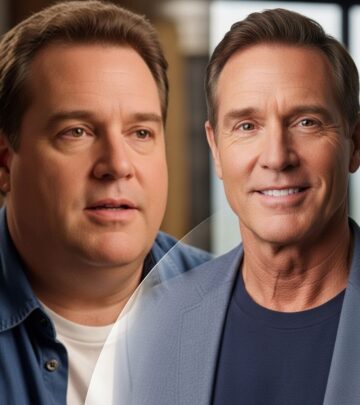James Corden Breaks His Silence: Why Ozempic Didn’t Work for His Weight Loss Journey
James Corden opens up about his struggles with food addiction, his experience with Ozempic, and what the conversation reveals about emotional eating and celebrity weight loss.

James Corden, beloved television host and actor, has spoken openly about his long-standing battles with weight, food addiction, and the rising wave of celebrity-endorsed weight loss drugs. In a world obsessed with quick fixes and viral solutions, Corden’s experience with Ozempic highlights the complexities, risks, and realities often hidden behind glamorous transformations.
Inside the Spotlight: James Corden’s History with Weight Loss
Corden, known for “The Late Late Show” and “Gavin & Stacey,” has long made his weight a topic of humor and vulnerability. He served as a Weight Watchers spokesperson and starred in the show Fat Friends, making his journey deeply public. Weight, food, and societal pressure have, by his own admission, been an ever-present rhythm in his life. In media appearances and interviews, he’s described the challenges of being in the public eye while coping with persistent struggles around eating, happiness, and body image.
The Rise of Ozempic: What Is It and Why is it Making Headlines?
Ozempic (semaglutide) was originally designed to help people with Type 2 diabetes manage blood sugar. However, clinicians soon observed significant appetite suppression and weight loss in many patients.
Ozempic acts as a GLP-1 receptor agonist, imitating a hormone that increases feelings of fullness and moderates appetite. Over the last two years, Ozempic and sister medications like Wegovy and Mounjaro have exploded in popularity, winning both celebrity and public endorsement as off-label weight loss solutions.
- Intended Use: Primarily for Type 2 diabetes
- Weight Loss Effect: Appetite reduction via hormone mimicry
- Trendy: Used off-label for cosmetic weight loss, especially in Hollywood and on social media
- Medical Supervision Needed: Best prescribed and monitored by specialists in endocrinology or gastroenterology
James Corden’s Experience: “It Didn’t Really Work”
On his podcast This Life of Mine and in interviews, Corden revealed he tried Ozempic during a period of intense public scrutiny and personal reflection. But despite widespread reports of rapid weight loss on the drug, his results were starkly different.
“I tried Ozempic, and it won’t be surprising to you when you look at me now, that it didn’t really work… All it does is make you not hungry. But I am very rarely eating just because I’m hungry.”
Rather than experiencing the substantial weight loss reported by some, Corden’s relationship with food remained unchanged. The drug’s capacity to curb physical hunger was powerless against the deeper pulls of emotional eating and food addiction.
Main Takeaways from Corden’s Testimony:
- Appetite Suppression Alone Isn’t Enough: Emotional eating and food addiction are not addressed by simply dulling physical hunger.
- Individual Responses Vary: Not everyone will lose substantial weight on Ozempic.
- Quick Fix Myths: Hollywood’s rush to new treatments doesn’t guarantee universal success.
Food Addiction and Emotional Eating: The Hidden Drivers
“You can take a drug like Ozempic… but it doesn’t change the emotional connection I have with food,” Corden candidly shared. He described patterns of binge eating and a complex relationship with food that extends decades. For many, food is comfort, escape, reward, and a way to cope with the daily stresses of fame and life alike.
| Physical Hunger | Emotional Eating |
|---|---|
| Bodily signal for sustenance | Responses to stress, boredom, sadness, or joy |
| Satisfied by any food | Craving specific foods (often high in sugar, fat, or salt) |
| Subsides after eating enough | May persist after fullness |
| Rarely tied to guilt or shame | Often followed by guilt, regret, or secrecy |
Corden’s struggles are shared by millions: the challenge is not always the consumption of calories, but the why behind the eating. Emotional eating is complex, often tied to personal history, trauma, and mental health.
Other Famous Faces: Ozempic and Its Controversies
Corden is not the only celebrity to publicly discuss their experiences with the drug.
- Stephen Fry: Experienced severe nausea and vomiting—“threw up five times a day”—and ultimately quit Ozempic after increasing sickness.
- Oprah Winfrey: Admitted to using Ozempic for weight loss and subsequently stepped down from the Weight Watchers board, sparking debate about transparency and the pressure to promote certain “solutions.”
The spread of weight loss injections among A-listers (and their followers) has raised critical questions about:
— The safety of obtaining these drugs outside of medical supervision
— The psychological ramifications of chasing fast weight loss without deeper behavioral change.
— The phenomenon of stigma shifting: formerly directed at obesity, now increasingly at those seen as taking shortcuts with medication.
What Do the Experts Say? Medical and Psychological Insights
Dr. Ashwin Soni, founder of The Soni Clinic in London, emphasizes that Ozempic should only be prescribed and supervised by medical professionals. The rapid popularity of GLP-1 agonists has outpaced most people’s understanding of the drug’s real risks and best practices.
- Quality Control: Risks when purchasing from unofficial sources; crucial to use legally prescribed medication of known provenance.
- Medical Monitoring: Patients need regular check-ups. Monitoring is essential for early identification of gastrointestinal or pancreatic issues.
- Potential Long-Term Effects: Gut and pancreatic complications, possible metabolism and skin changes due to rapid weight shifts.
From a psychological standpoint, leading experts underscore that weight loss medications cannot resolve deeply ingrained behaviors or address the mental health roots of food addiction. Sustainable health improvements require therapy, self-understanding, lifestyle shifts, and support networks—not just chemistry.
The Reality Check: Why Quick Fixes Often Fail
Ozempic and similar drugs are often viewed as magic bullets. But the lived experience of James Corden, and the clinical data emerging from diabetes and obesity management, show that no single intervention is enough for everyone.
- For some, substantial weight loss can occur—especially if eating is mostly driven by hunger or appetite cues.
- For others, especially those battling psychological addiction to food, results may be modest and come with increased emotional distress or physical side effects.
- Safety, sustainability, and authentic health require a comprehensive biopsychosocial approach: medical, nutritional, psychological, and lifestyle strategies must all be considered.
James Corden’s Message: Honesty, Vulnerability, and Moving Forward
Corden’s willingness to speak candidly about his journey invites a wider conversation not just about weight, but about compassion for oneself and others. Key elements of his message include:
- Rejecting Shame: Corden describes decades of cycles: using food to self-soothe, feeling guilty, then hiding both the eating and the feelings from those around him.
- Therapy and Mental Health: He relates to other high-profile voices, like author and presenter Richard Osman, who have shared their own struggles with food and addiction.
- Role Models: His honesty may help reduce stigma and spark more honest conversations among everyday people, not just celebrities.
Ozempic Dangers: Risks of Self-Treatment and Online Trends
The dangers don’t end with side effects. Experts warn against sourcing Ozempic and similar medications online or via unofficial providers. Using these drugs without proper supervision can result in unregulated dosages, contaminated products, missed diagnoses, and unmanaged health risks. As Dr. Soni stresses, the ideal setting for Ozempic use involves:
- Prescription by a qualified professional (ideally an endocrinologist or gastroenterologist)
- Regular health checks and lab work to monitor for side effects
- Integrated support for mental health, nutrition, and physical activity
The Bigger Picture: What Corden’s Story Means for Us All
James Corden’s journey exposes key truths:
- Weight loss is a multi-dimensional challenge, not always solved by suppressing hunger.
- Food addiction and emotional eating are real, powerful, and require specialized support.
- Celebrity experiences with new drugs offer caution and insight, but not simple answers for the public.
- True well-being involves vulnerability, honest self-exploration, and seeking professional help where needed.
As the conversation about Ozempic and similar medications evolves, so does our collective understanding of what it means to pursue health in a world of constant comparison, pressure, and high expectations.
Frequently Asked Questions (FAQs)
What is Ozempic and how does it work?
Ozempic is a prescription drug used primarily to treat Type 2 diabetes. It simulates the effects of the GLP-1 hormone, helping regulate appetite and making patients feel fuller longer. This can lead to significant weight loss for some people, especially when eating is closely tied to appetite.
Why didn’t James Corden lose weight on Ozempic?
Corden said that Ozempic only made him less hungry, but wasn’t effective for his emotional eating and food addiction. He rarely ate simply out of hunger, so appetite suppression alone didn’t address his underlying behaviors and relationship with food.
What are the risks of using Ozempic for weight loss?
Potential risks include gastrointestinal side effects, impact on the pancreas and other organs, metabolic disturbances, and the dangers posed by obtaining the medication from unofficial or unregulated sources. Ongoing medical supervision is highly recommended for anyone using these types of drugs for weight loss.
Do other celebrities use Ozempic?
Yes. High-profile figures such as Oprah Winfrey and Stephen Fry have openly discussed their experiences—both positive and negative—with Ozempic and similar medications, further spotlighting the trend and the controversies surrounding off-label weight loss drug use.
Is medication alone enough to treat food addiction?
No. Experts and those with lived experience, including Corden himself, agree that medication can address physical hunger but not the deeper psychological factors. Effective treatment for food addiction and emotional eating typically includes therapy, lifestyle changes, and robust professional support.
Ozempic and Celebrity Weight Loss: At a Glance
| Aspect | Description |
|---|---|
| Drug Type | GLP-1 receptor agonist; appetite suppressant |
| Primary Use | Management of Type 2 diabetes |
| Off-Label Use | Weight loss, increasingly common among celebrities and in public |
| Success Rate | Varies; not universally effective, especially in cases of food addiction or emotional eating |
| Risks | GI problems, metabolic shifts, dangers of self-prescription, psychological impacts |
| Expert Advice | Medical supervision essential; long-term change needs holistic treatment |
Further Resources
- National Eating Disorders Association: Information on emotional eating and food addiction
- American Diabetes Association: Guidelines on diabetes medications and safe weight loss
- Mind UK: Support for mental health concerns related to food and body image
Final Thoughts
James Corden’s account of Ozempic offers no fairy-tale cure, but a powerful reminder of the humanity behind every headline—celebrity or not. As the world races for quick fixes, his voice adds essential realism and empathy to the weight loss conversation: enduring change isn’t found in a bottle but in the patient, courageous work of understanding ourselves, seeking help, and striving for lasting well-being.
References
- https://georgiaaddictiontreatmentcenter.com/2024/10/03/james-corden-admits-he-tried-ozempic-but-it-didnt-really-work/
- https://www.hellomagazine.com/celebrities/720570/james-corden-opens-up-ozempic/
- https://www.businessinsider.com/james-corden-says-did-not-lose-weight-ozempic-emotional-eating-2024-9
- https://www.the-independent.com/voices/james-corden-ozempic-weight-loss-binge-eating-b2620504.html
- https://www.marieclaire.com/celebrity/james-corden-ozempic-weight-loss/
- https://www.prevention.com/weight-loss/a62387917/james-corden-weight-loss-ozempic/
Read full bio of Sneha Tete












